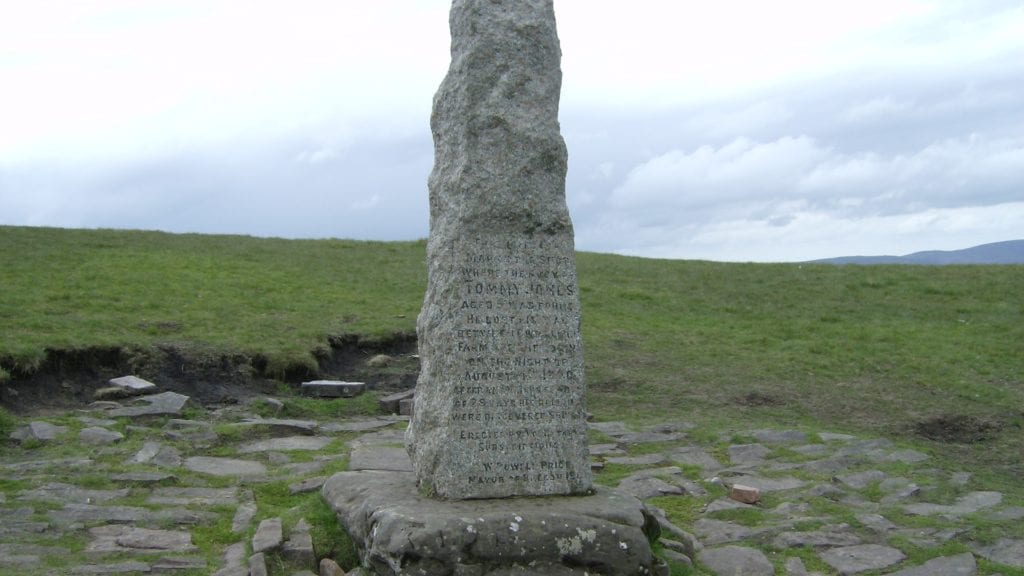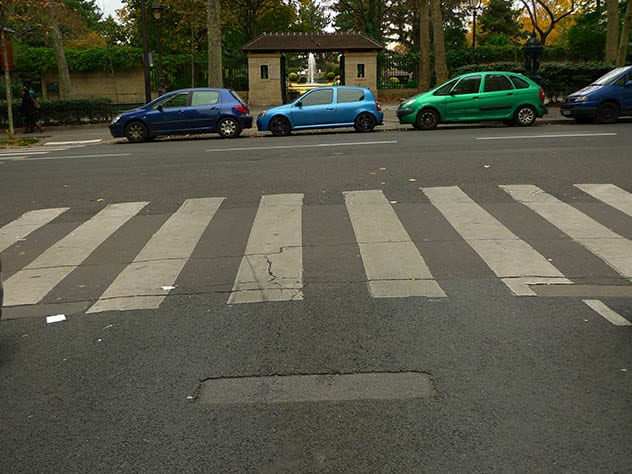 History
History  History
History  Health
Health 10 Everyday Activities That Secretly Alter Consciousness
 History
History Top 10 Historical Disasters Caused by Someone Calling in Sick
 Animals
Animals 10 New Shark Secrets That Recently Dropped
 Movies and TV
Movies and TV 10 Forgotten Realities of Early Live Television Broadcasts
 Technology
Technology 10 Stopgap Technologies That Became Industry Standards
 Weird Stuff
Weird Stuff 10 Wild Facts About Taxidermy That You Probably Didn’t Know
 Travel
Travel 10 Beautiful Travel Destinations (That Will Kill You)
 Miscellaneous
Miscellaneous 10 Modern Marriage Rituals Born from Corporate Branding
 Weird Stuff
Weird Stuff Ten Bizarre Visions of 2026 from Fiction
 History
History 10 “Modern” Problems with Surprising Historical Analogs
 Health
Health 10 Everyday Activities That Secretly Alter Consciousness
 History
History Top 10 Historical Disasters Caused by Someone Calling in Sick
Who's Behind Listverse?

Jamie Frater
Head Editor
Jamie founded Listverse due to an insatiable desire to share fascinating, obscure, and bizarre facts. He has been a guest speaker on numerous national radio and television stations and is a five time published author.
More About Us Animals
Animals 10 New Shark Secrets That Recently Dropped
 Movies and TV
Movies and TV 10 Forgotten Realities of Early Live Television Broadcasts
 Technology
Technology 10 Stopgap Technologies That Became Industry Standards
 Weird Stuff
Weird Stuff 10 Wild Facts About Taxidermy That You Probably Didn’t Know
 Travel
Travel 10 Beautiful Travel Destinations (That Will Kill You)
 Miscellaneous
Miscellaneous 10 Modern Marriage Rituals Born from Corporate Branding
 Weird Stuff
Weird Stuff Ten Bizarre Visions of 2026 from Fiction
Top 10 Creepiest Places On Earth (That You Probably Don’t Know)
There’s some place in every neighbourhood that holds a creepy sway over the people there—a park, an abandoned house, a railway bridge that comes with a dark legend. It has always been a fascinating, if difficult to explain, phenomenon; many writers and filmmakers have used this phenomenon to great effect—from Stephen King’s towns of “Derry” or Lovecraft’s “Innsmouth” to “Boo Radley’s house” in Harper Lee’s classic “To Kill a Mockingbird”, some places are simply creepy, whether logically justified or not.
Here’s a list of ten real creepy places, some that will instantly cause you to poop your pants and flee, some you won’t even realise are creepy until you learn its dark history.
Top 10 Iconic Places Pictured From Behind
10 Deadman’s Island, England
This little island near the Isle of Sheppey in the county of Kent, lying in Medway estuary where the Swale meets the river. Like any bona fide creepy island, it is off limits to the general public. But why would this place in the so-called ‘Garden of England’ be creepy, save its name? For once, the name really does say it all.
About 200 years ago, England had a real issue with where they could house the nation’s prisoners. Gaols were full and you couldn’t just hang everyone. Given that Britain’s empire spanned the globe, there were a lot of ships going back and forth. So prison hulks were born (large ship that would house prisoners prior to shipping them off to some far flung corner of the world, like the one alluded to in the opening of Dickens’ ‘Great Expectations’). Deadman’s Island is covered with the bones of many such men and boys, probably those who died of disease aboard the cursed ships. Amongst the rocky outcrops, sand and shells on the island, you’ll just as likely spot a jawbone, femur or an eyeless skull staring back at you. Great fishing spot, though…[1]
9 Pearl’s Airport, Grenada
Graveyards are inherently creepy. This ‘graveyard’ does not house mouldering corpses under the ground, though. Rather, it’s a sort of above ground graveyard for soviet-era Russian and Cuban aircraft.
Pearl’s was Grenada’s first airport, opening in 1943 before quickly being taken by the Allied forces as a military air base during the second world war. By 1979, the Grenadian government had been taken over by a Marxist-Leninist party named the ‘New Jewel Movement’. Over the next few years, Grenada looked like many tin-pot communist states—rife with corruption, coups and extrajudicial murders. This prompted the USA to invade. During the American occupation of Grenada in the early 80s, the airport was captured by the 8th marine regiment and used as their base of operations.
The creepiness here is that the disused airport serves as a reminder of a bloody invasion, a totalitarian regime and a time the world nearly went up in flames.[2]
8 Truby King Recreation Reserve, New Zealand
The name of this place doesn’t exactly make the hairs on anybody’s neck stand on end—it sounds like the sort of place you’d love to have a picnic with your family. Try this one—The Seacliff Lunatic Asylum. Creepier? Good, because that’s exactly the place that used to exist on this nature reserve. And it’s creepy as hell.
There are plenty of abandoned and renovated mental institutions you can visit all over the world, and they’re plenty creepy—there is something really disquieting about a place where a mental hospital used to stand. There is not much chance of a hokey, ghost-hunterish, manufactured jumpfest here. It feels sad, haunted by real pain and the crimes of long-dead patients. One such person was Edward Lionel Terry, an Englishman who murdered a destitute Chinese migrant named ‘Joe’ Kum Young in 1905. The asylum also suffered a fatal fire which ripped through ward 5 in 1942, killing all but two female patients. Not much of the original building remains, but that adds to the eeriness, conjuring images of lost souls wandering the grounds looking for their bed…[3]
7 Davelis Cave, Greece
Every ancient culture has a few important caves. We did used to live in them, after all. Hellenic culture has a very close association with caves, especially putting virginal ‘oracles’ in them to get hopped up on goofball gasses to tell the future. This cave in Penteli, north Athens evokes such weirdness and has the history to justify it.
The cave was once a centre for the worship of the god Pan and the nymphs, a place for revelry where the lines between the temporal world and the world beyond are blurred. Later, Orthodox Christians used the cave as a hermitage, founding small church dedicated to both Saint Spyridon and Saint Nicholas (the latter famously being the basis for our modern depiction of Father Christmas—and having dealt with the devil). In the 1800s, the cave was a base for ‘Davelis’, a bandit who lent his sobriquet to the cave’s name and apparently hid some treasure there. The place was also used by the military during the cold war, lending a certain Area 51 weirdness to the place to go along with the occultish feeling. Many legends, both older and urban, are associated with the cave—paranormal activity is often reported in this dank, dark portal to the underworld… obviously.[4]
6 Kuldhara, India
When you imagine a ghost town, images of a mining community left to be consumed by the encroaching desert somewhere in the Western US is typical. A place where the promises of the gold rush never materialised. You probably didn’t have a Brahmin settlement in Rajasthan in mind, did you?
Centred around a temple to the mother goddess (possibly Parvati), which shows remnants of statues depicting Ganesha, Vishnu and the Asura Mahishasura as well as an unnamed , local horse-riding deity. Local legend has it that the villagers were driven out by a lecherous man named Salim Singh who wanted to claim a local girl for himself. He sent guards to collect her, but the villagers sent them away ’til the next morning. When the guardsreturned, the village was abandoned. Before they left, the villagers cursed Kuldhara, causing all who tried to live there to be plagued by supernatural entities.[5]
Or the village became gradually depopulated by the 1890s due to a dwindling water supply…
10 Creepy Places That Are Serial Killer Playgrounds
5 Himeji Castle, Japan
On first glance, this is a classic example of a Japanese castle—magical, like something from a Studio Ghibli film. But scratch the surface and you’ll learn about the creepy folklore associated with Himeji Castle. And, much like horror classic ‘Ringu’, there’s a creepy well on site.
The story of how an evil, plotting samurai named Tetsuzan had his plot to murder the Castle’s lord, Norimoto foiled by a beautiful servant named Okiku is a sad ghost story. Okiku confided in her lover, a brave warrior named Motonobu, telling him of Tetsuzan’s plot to seize Himeji Castle. Motonobu told Lord Norimoto who feld. Tetsuzan’s evil servant, a man called Danshir, learned that it was Okiku who had leaked the plan. Seeing her beauty, the evil Danshir decided to have her for himself, finding someone else to blame for the foiled plot. She rebukes him 3 times, choosing her love for Motonobu over her safety. Danshir kills Okiku in a jealous rage and throws her body down the well. It is said that, if you find yourself near the well at night, you can hear her frantic whispers emanating from the well.[6]
Nope.
I’ll just get some macha soft serve ice cream and some dango on a stick, please.
4 Bunce Island, Sierra Leone
Our second river island on this list is equally horrific, equally creepy but different in one key way—you can visit there. Ok, there are other differences. It wasn’t diseased prisoners found on this island; it was a centre for English slave traders, not criminals. It’s located in Sierra Leone, not England. And it was often raided by pirates like Barti Ddu (Black Bart in English) and the French during their many wars with Britain.
Bunce Island was the main processing point for slaves bound for the British colonies Georgia and South Carolina, used to work the rice plantations there. The once powerful ‘slave castle’ on the island survived many raids from Portuguese and Creole Luso-African raiders and pirates through the eighteenth century but couldn’t survive against one powerful foe—the abolition of slavery. By 1840, over 30 years since the abolition of slavery in Britain, the place was abandoned. A tragic air pollutes this place today, with funding set aside to renovate the island as a tourist destination. Perhaps it should be left to nature—history has been recorded, perhaps the ghosts of the past should be laid to rest.[7]
3 Tommy Jones’ Obelisk, Wales

There is something tragically beautiful about this monument found in the wilds of the Brecon Beacons mountains in South Wales— The obelisk marks the place where the body of a little boy who got lost was found, now often used as a landmark for hikers who are uncertain of their location when the mountains get foggy. This is much less a simple memorial than a tool to avoid future tragedies.
The far more famous story of ‘The Lady of the Lake’ often overshadows the (far less mythological) story of Tommy Jones, but it’s worth knowing: Tommy was a 5-year-old boy from the coalfields of the Rhondda valley who was on his way to visit his grandparents who lived on a farm near the ancient town of Brecon in 1900. He met up with his grandfather and William, his 13-year-old cousin, with whom he set off to tell his grandmother that he had arrived and to expect his dad too. At some point, little Tommy got scared of the dark and decided to head back to his father had been. He never made it back. The family and some soldier who were rifle training nearby began the search immediately. Nothing. A few weeks went by, with searches of the wild countryside conducted every day until, a month later, Tommy’s body was found where the monument now stands.[8]
2 Old Franklin Park Zoo, USA
Seeing long abandoned cages that used to house bears is almost as distressing as seeing cages with bears still held inside them. Thankfully, animals are treated marginally better nowadays (in many parts of the world, at least—we’re looking at you Pakistan). This abandoned zoo in Boston, MA, serves as a sad reminder of how we used to treat these apex predators.
Within the dilapidated, crumbling buildings, once a massively popular attraction for Bostonians, you can still see the steel cages and barred enclosures that housed the bears. If you find abandoned prisons creepy, you may well find this abandoned animal jail just as weird.[9]
1 Just a normal street in Paris, France…

Except it isn’t all that ‘normal’. It looks pretty unassuming, to the untrained eye. But seldom do people look down and really wonder what it is they’re looking at (unless they’ve stepped in dog mess). Five indentations mark the tarmac on the Rue de la Roquette, just in front of a crosswalk. What could they be? The site of some car crash, or just where a particularly heavy lorry passed over? Why should anyone care anyway?
These indentations mark the spot where the Paris guillotine stood within the long gone Prison de la Roquette. This death machine was employed in the public beheading of 69 convicts between 1851 and the closing of the prison in 1899. The markings on the road once housed the support stones on which ‘Madame Guillotine’ stood. It is said that if you stand in the centre point of the five indentations for too long, you’re bound to die… mainly because you’d be randomly standing in the middle of a road.[10]
Top 10 Places Famous For Bizarre Reasons
About The Author: C.J. Phillips is a storyteller, actor and writer living in rural West Wales. He is a little obsessed with lists.








